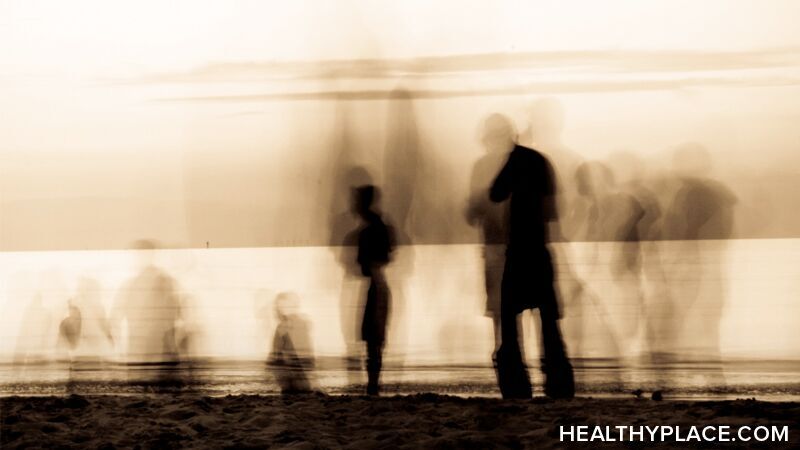What is Bipolar Psychosis?
Comprehensive examination of bipolar psychosis, including signs, symptoms, causes and treatments of psychosis in bipolar disorder. Plus stories of living with bipolar psychosis.
Part 1: Bipolar with Psychosis
Bipolar disorder is an illness that affects a person's ability to regulate their moods. The two main mood swings are mania and depression and most people familiar with the illness have at least a basic understanding of these two symptoms. But when it comes to bipolar psychosis, knowledge can be limited and this very complex and very normal part of bipolar disorder is often underreported or missed until it's too late. One reason for this is that there are still many people who don't know that psychosis is common for people with Bipolar I (one) during manic and depressive episodes and is often present in Bipolar II (two) depression as well. But the main problem is that the general public has such a distorted view of bipolar psychosis, it's difficult to find real and helpful information regarding this fascinating and often very destructive symptom of bipolar disorder.
About This Section
This section covers the topic of psychosis and how it relates to bipolar disorder. The first section gives a technical description of psychosis. The second section offers more information regarding the relationship between psychosis, mania and depression. The final section explains the medications used for treatment of bipolar psychosis. If you are not familiar with bipolar disorder and its treatment, my article The Gold Standard for Treating Bipolar Disorder gives a full account of the illness along with medication and management plan information. As with all of my articles on HealthyPlace.com, my colleague and co-author, Dr. John Preston, provided the technical information found in this article. You will see his quotes throughout the article. The statistics for the rates of psychosis is bipolar disorder are from the book Manic-Depressive Illness: Bipolar Disorders and Recurrent Depression by Goodwin, F.K and Jamison K.R. (2007) Oxford University Press: Oxford and New York.
Basic Facts about Bipolar Psychosis
- Bipolar psychosis is always attached to either mania or depression. It doesn't exist on its own.
- Bipolar psychosis is common in bipolar mania. Up to 70% of people in a full-blown manic episode experience psychosis. (People with Bipolar II hypomania rarely experience psychosis.)
- Though studies vary, it's estimated that 50% of people with bipolar depression experience psychosis. Though it's more common in severe depression, it can be present in moderate depression as well.
- Bipolar psychosis causes a break with reality, loss of reasoning and ultimately, resistance to treatment when it goes too far without medications.
- Bipolar psychosis can be very disruptive and cause significant work and relationship problems due to misperceptions and false beliefs.
Most people are very confused and puzzled by psychosis. I have experienced and studied the topic for years and it can still be an enigma! It's very easy to confuse the thoughts, feelings, and behaviors caused by manic and or depressive mood swings with those caused by psychosis. The goal of this article is for you to easily recognize the difference and then see if you or the person you care about experiences psychosis.
My Story of Living with Bipolar Disorder Psychosis
From my journal: May 21, 1994
Ivan has been on the locked psych ward for 20 days. I walked in the ward yesterday and he said, "How are you, Julie?" I was so pleased with this question. It shows he's getting better! I said, "I'm fine." Then he got the dark look in his eyes. He said, "And how is the baby you had yesterday?" Oh well, so much for getting better.
In 1994, my partner Ivan went into a psychotic/manic episode on his 22nd birthday. Within a few days he was so ill he was hospitalized and stayed in a locked ward for over six weeks. He was eventually diagnosed with Bipolar I. He was alternately happy to see me and then extremely suspicious. He had constant hallucinations and delusions and did not know where he was or if I was safe. I learned a lot about psychosis during his illness, as I visited him on the ward every day. It was devastating to see how the mania and psychosis took over his mind so quickly. I'd never seen anything like it!
Oddly enough, in 1995 after years of excessive depressive and unrecognized hypomanic mood swings, I was diagnosed with Rapid Cycling Bipolar II. After my diagnosis, I realized I had been psychotic off and on since age 19. In fact, you may say that my entire bipolar disorder writing career started with a psychotic hallucination! In 1998, I was more ill than I had been in my life as my treatment was not effective. I went to visit my mother in Hawaii. As I was driving down the street towards Waikiki, I started to cry. I was just so ill and didn't know how to help myself. I stopped at a traffic light and looked down at my hands. Both of my wrists were bleeding and I thought to myself- oh no, I have finally tried to kill myself. Then I looked up as the light turned green. When I looked back down at my hands, there was no blood. This strong and very real feeling visual hallucination change my life. It was literally, at that moment, that I decided to take charge of managing my bipolar disorder. Maybe learning about psychosis in this article can be life-changing for you as well!
APA Reference
Fast, J.
(2021, December 28). What is Bipolar Psychosis?, HealthyPlace. Retrieved
on 2025, December 18 from https://www.healthyplace.com/bipolar-disorder/psychosis/what-is-bipolar-psychosis



